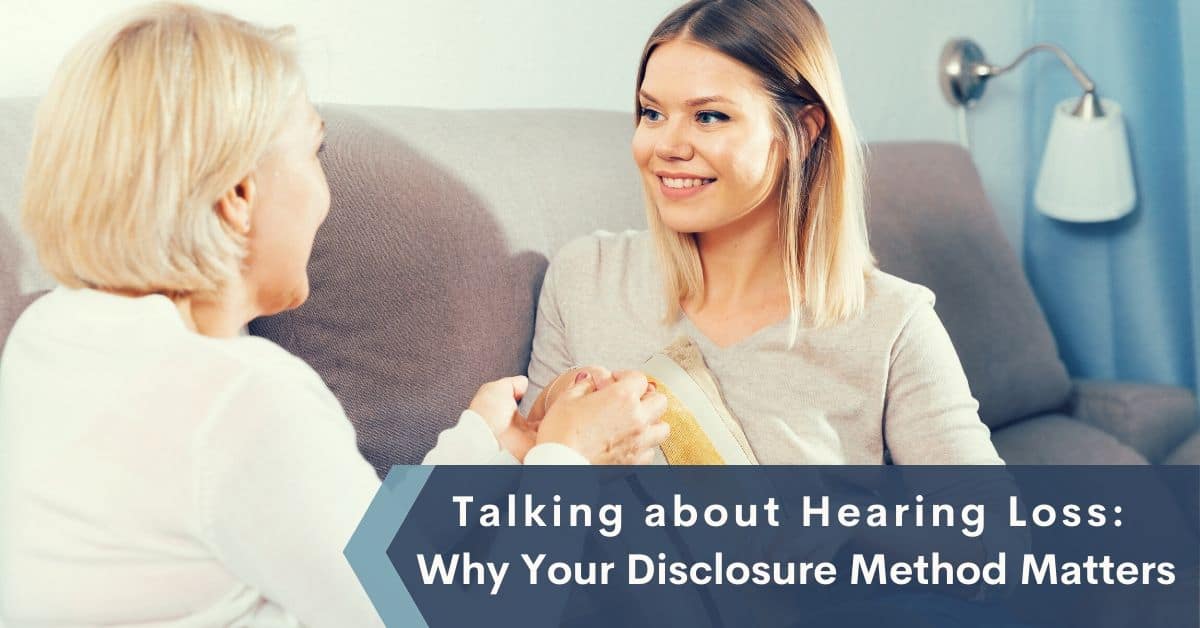Have you been finding it hard to understand people recently? Do you have to ask people to repeat themselves and have trouble hearing certain pitches? Hearing loss can sneak up on the best of us and can be hard to accept.
One important step in dealing with your hearing loss is accepting you have a problem. Only then can you take the steps to treat your hearing loss. Another step is letting the people in your life know you have hearing loss. This is a task that is important for all your relationships; with those you spend time with at work and home. Letting people know you have a hearing loss can help them accommodate your needs around hearing, assuring that you can communicate clearly with one another.
The way that you disclose your hearing loss to others can make a big difference in the success of your relationships and ultimately your quality of life.
Study on Disclosure
A study at Massachusetts Eye and Ear surveyed 337 people about how people talked about their hearing loss to others. The survey identified common phrases used to speak to family friends and coworkers about hearing loss. The study identified three main disclosure methods that were used the most and explored their success. Success of disclosure was monitored and assessed by the amount of emotional support the survey participants felt in dealing with their hearing loss.
Non-Disclosure
Non-disclosure was classified as people who choose not to tell the people in their life about their hearing loss. Often stigma of old age and hearing loss kept these people from explaining their disability. Researchers found that non-disclosers asked people to speak up, repeat themselves or placed the blame on others for their hearing loss. Often they accused others of mumbling rather than admitting that the problem was theirs. As you can imagine, the relationships of non-disclosers suffered. Resentment built up in relationships, intimate conversation between partners dwindled and they often chose to self-isolate. The results of non-disclosure often ended in loneliness and depression rather than a healing solution.
Basis Disclosure
Basis disclosure involves disclosing only to people this group trusted the most. They might hint that they can’t hear as well as they used to. This method will help you communicate better at home with your loved ones making fewer instances for resentment and misunderstanding. Knowing you are dealing with hearing loss will allow the people around you to speak louder and slower so you can understand, or make sure you can see their lips when speaking, so lip reading can occur. While this makes listening at home easier, it can still create hurdles in crowded loud environments when people don’t know you have a hearing loss.
Multipurpose Disclosure
Multipurpose disclosers are very open about their hearing loss to the people they meet and people close to them. They can explain their hearing loss, how it affects them and ways that you can help. A multipurpose discloser will ask people to turn down the background music so they can hear better or ask people to speak one at a time in groups. This group gets the most accommodations because they are open about their limitations and their needs. While asking your friends and family to support you through hearing loss is extremely helpful, hearing aids can alleviate common struggles with hearing. They amplify the world around you and send it directly to your ear canal so you can hear conversations you may have begun to struggle with again. Because multipurpose disclosers are more likely to ask for help they are also more likely to seek treatment with hearing aids.
Treating Your Hearing Loss
The study found that those who are most open about their hearing loss were much more able to ask for the help they needed. When you are open and deal with hearing loss, you can get the help you need and deserve so you can continue to thrive in your relationships and your life. If you suspect you are living with hearing loss, contact us to set up a hearing test!

